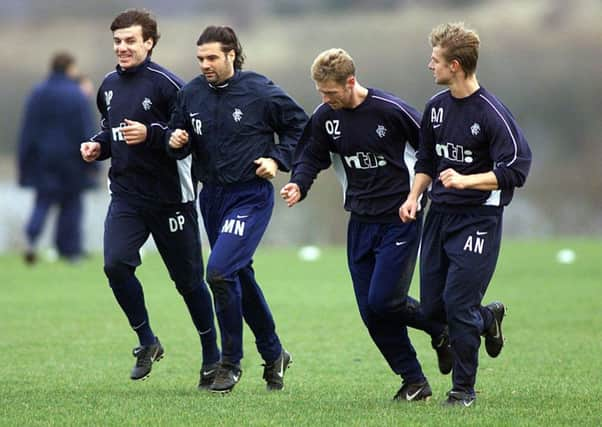Stephen Halliday: The tragic death of Daniel Prodan


A hugely gifted defender, who was one of the outstanding performers in his country’s impressive run to the quarter-finals of the 1994 World Cup finals in the USA, he joined Rangers from Atletico Madrid for a fee of £2.2 million in the summer of 1998.
But in one of the more bizarre episodes of the Ibrox club’s big spending under the management of Dick Advocaat, Prodan never made a first-team appearance before he was eventually given a free transfer almost three years later.
Advertisement
Hide AdAdvertisement
Hide AdHe arrived at Rangers with a knee problem which went undetected amid insufficient medical checks during a period of radical transition and personnel overhaul as Walter Smith departed to be succeeded by Advocaat. As it transpired, the only appearance Prodan made at Ibrox during his career was for Steaua Bucharest against Rangers in a Champions League group stage match in November 1995. Two months earlier, he had smashed home a stunning late winner for Steaua in the reverse fixture in the Romanian capital. Sadly for Prodan, who also played for Romania in the Euro ’96 finals in England, he was unable to display his obvious talents in a Rangers jersey which he only wore in a few appearances as an overage player for the club’s under-21 side. Following his arrival, there were initially mutterings of discontent from the Ibrox hierarchy that Atletico Madrid had sold Prodan in full but undeclared knowledge of his serious knee injury. But later reflections, by both club doctor Stewart Hillis and chairman David Murray, below, accepted the degree of negligence on Rangers’ part.
“I have to take the responsibility,” said Hillis, the highly respected former SFA medic who died two years ago, when the full extent of Prodan’s problem became evident three months after he had signed. “When the player came in July we looked at the medical details and saw that a straightforward cartilage operation had been done. The operation he had done was a good job, no question about that, and he does not need another one. There is no suggestion of hidden information, we have all the details from Spain and Romania. However, it is a decision that is individual to each player. When you are going to sign someone, how far do you take the injury back – three months, six, or a year?”
As Prodan tried to recover full fitness, he was loaned out to Rocar Bucharest in his homeland where he played regularly. Speaking in December 2000, he said: “My injury is OK now and I don’t even think about it anymore. Now it is the winter break for the Romanian league and I want to come back and play for Rangers. I want to show the people at Rangers and the fans that Daniel Prodan is a good player.”
But despite earning a recall to the Romanian national team, Prodan could not convince Advocaat he merited a place in his plans and he was given a free transfer in February 2001. Murray, speaking in the 2004 book The Advocaat Years which charted the Dutch coach’s tenure at Ibrox, admitted that the blizzard of new arrivals recruited in the summer of ’98 had contributed to Rangers overlooking Prodan’s injury.
“We were bringing in players every day,” said Murray. “They were coming in by the hour at that time because we were rebuilding. But Prodan was a big, big mistake because he didn’t get a proper medical at the time. That was a big error collectively and we must all put our hands up. But at the end of the day, all the people behind the scenes can disappear into the background, I’m the only man left standing. Walter’s gone, Dick’s gone, the Doc’s gone but I’m the only man left and I’m saying it was a big mistake.”
Prodan finished his career with National Bucharest, finally being forced to retire at the age of 31 in 2003. He later served as sporting director of the Romanian FA and served on a number of Uefa committees. He died after suffering a heart attack at home.